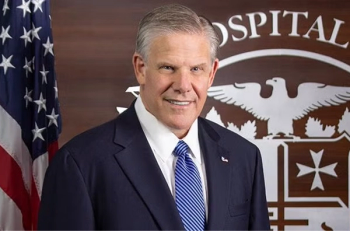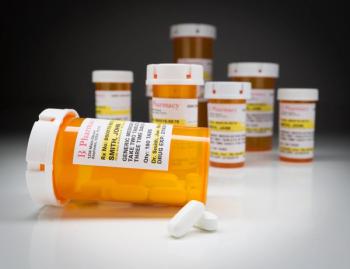
For Kroger Health, focus on food is ‘a great moment’

The division of the Kroger supermarket chain aims to play a role in changing health care. Colleen Lindholz, president of Kroger Health, talks about the opportunity ahead.
The HLTH conference in Las Vegas featured hundreds of companies, many touting AI tools and other cutting-edge technologies.
Among those many booths in the Venetian Convention & Expo Center, one display offers a colorful assortment of lemons, oranges, peppers and other fruits and vegetables. Kroger Health, a division of Kroger Co., the nation’s largest traditional supermarket chain, offered a bit of a contrast to some of the other companies at the conference.
Colleen Lindholz, the president of Kroger Health, said her parent company is engaged in far more than groceries. Kroger operates pharmacies in 2,200 of the company’s 2,700 supermarkets, along with 221 community care clinics. The company has stores in 35 states.
“What's really exciting about Kroger is what we aspire to do,” Lindholz told Chief Healthcare Executive®.
“We want to change the way health care is delivered in the United States with really a focus on prevention, a focus on food and nutrition overall,” she says. “So that's been a pretty large goal of ours. Our vision is to help people live healthier lives. And while it's only a few words, it means a tremendous amount to us.”
(See part of our conversation in this video. The story continues below.)
‘The right time’
The Trump administration, notably Health Secretary Robert F. Kennedy Jr., has said it is aiming to shift the federal government’s focus on healthcare policy to prevention. Healthcare leaders such as
- Read more:
Seeing momentum for value-based care
Given that growing attention to the role of food in overall health, Kroger Health is well-positioned to help make positive changes.
“It's a great moment in time for us,” Lindholz said. “We've been pushing on the transformation of the food system.”
“I think right now is the right time,” she added. “It's the right time not only because our country needs it, but it's the right time because the customer, the average consumer, is thinking about it also.”
Pointing to President Trump’s touted desire to “make America healthy again,” Lindholz said Kroger Health has been working on that for years.
“We already have been a part of the movement,” she said. “We're not just coming in right now saying, ‘Hey, we want to help redefine healthy.’ We have already been working on this stuff, so it's complimentary to what we're already doing. I love it because we've been working hard on it already.”
"We believe in the preventative power of food, and we believe in prevention overall," she said. "And our system, by the way, is built around supporting illness, not necessarily wellness."
Kroger Health has touted its “Food for Health” program. Kroger has also developed a nutrition scorecard to help customers get more insights into the foods they are putting in the grocery cart.
Working with the FoodHealth Company (formerly called bitewell), Kroger Health offers an app that allows customers to scan the barcode, and they’ll get a score from zero to 100 on that particular item.
Lindholz says the scorecard can help people gain more information about their foods. While most people likely understand a candy bar won’t have a high score, the scorecard can help people learn more about foods that may appear fairly healthy but also have higher levels of sodium that they may want to avoid. Shoppers can then look to other potentially healthier options.
“We are trying to bring not only transparency, but simplifying how people can make healthier food choices,” Lindholz said.
“It's about transparency and it's about bringing real life solutions right to where people are, and that's what we're standing for,” she added. “And that's why I love what's happening at the government level right now, because we've been trying to say, ‘Hey, let's take the bad stuff out of food for quite some time, and let's make food that's better for people.’”
‘Making nutrition a vital sign’
Given the amount of money being spent on health care even as the United States lags other countries in health metrics, Lindholz said it’s time to look more at ways to keep people healthy, and there’s no better place to start than with food.
“We've got a problem, and what we’ve got to do is get to the heart of the matter,” she said. “And we believe a part of the puzzle that we're putting together for prevention is the nutrition component.”
Kroger Health appeared at HLTH in hopes of forming new partnerships, and the company has taken other steps to build support. Kroger hosted a conference called “Nourishing Change,” and invited some of its competitors in the supermarket industry.
“That's where I'm really proud of what we're doing, because it's not about us, but bringing the other grocery retailers and really retail in general, reimagining how retail can really lead transformation in health care,” Lindholz said.
Lindholz said Kroger Health is also advocating for “making nutrition a vital sign in the doctor's office.”
Just as doctors check patients' blood pressure and cholesterol, physicians should evaluate the nutrition of patients.
“We can measure nutrition,” she said. “We can measure the gut microbiome. We can measure certain things around your health, around nutrition.”
Lindholz said she’d like to see more incentives for doctors to work with dieticians to prescribe better foods, with funding for such programs.
“What would that do to not only preventing chronic disease, but actually the management of chronic disease,” she asks. “What would that do to the outcomes in our country over the next decade? So that's something that we're pushing very hard on.”






























